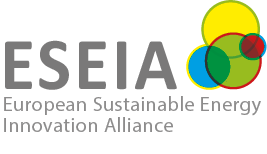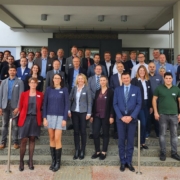RE4Industry Knowledge Transfer Seminar Austria: Key Takeaways
On 21 October 2022, the first RE4Industry Knowledge Transfer Seminar was held in Graz, Austria, bringing together 100 participants to discuss how to decarbonise EIIs.
The European Union (EU) is seeking to transition to an economy with net-zero greenhouse gas (GHG) emissions by 2050. Energy-intensive industries (EIIs), such as steel, cement, chemicals and more, are a crucial piece of the puzzle. Still, they present a particular challenge: The EIIs currently account for half of the energy consumption of the entire EU industry and, due to its energy-intensive production processes, are responsible for 14 per cent of the total GHG emissions in the EU. At the same time, EIIs employ around 7.8 million people and provide a value-added of EUR 549 billion (4.55% of the EU total).
Decarbonising EIIs is crucial for achieving EU climate targets and ensuring the EU’s industrial competitiveness and strategic autonomy. But how can these industries shift away from fossil fuel dependence? That question was at the centre of the first RE4Industry Knowledge Transfer Seminar, held on 21 October 2022 at the Graz University of Technology in Graz, Austria, in the framework of the Horizon 2020-funded project RE4Industry.
Organised by ESEIA in cooperation with the Federation of Austrian Industries of Styria and Carinthia, this seminar brought together industry representatives, experts and researchers from different fields to discuss how to decarbonise EIIs. We reviewed climate targets, explored solution packages, and discussed the push and pull factors of the energy transition. Here are the key takeaways.
Energy transition in EIIs: challenges and opportunities
The need to mitigate climate change and the cost of fossil fuels have made renewable energy a vital driver of the shift toward a low-carbon future. The energy transition in EIIs will be a long and complex process. There is no silver bullet solution to decarbonise this sector, but rather a variety of options that need to be tested and implemented to determine optimal solutions for each facility. The most promising renewable solutions include solar, geothermal, hydrogen and biomass energy. “EIIs decarbonisation will occur through a progressive use of an energy mix that allows European industrial sectors to remain competitive on a global scale,” pointed out the RE4Industry Project Coordinator Alessandro Carmona. By promoting current success cases of renewable energy integration in EIIs, RE4Industry aims to facilitate the further uptake of such solutions in the short and long term.
Bioenergy for EIIs decarbonisation
“Bioenergy is already a mature solution for several EIIs,” said the Business Development & Membership Director at Bioenergy Europe Manolis Karampinis, adding that its use for industrial process heat and industrial feedstock will need to increase significantly to achieve the energy transition. He presented the Milaki Plant, a cement production plant in Greece owned by HERACLES Group, as an example, explaining how they use biomass to replace coal and petcoke and significantly reduce GHG emissions. Thus, bio-based solutions may play a significant role in decarbonising the EIIs before other renewable options become economical and commercially available.
Full decarbonisation of EIIs calls for innovation, cooperation and investment
As a driver of innovation and a front-runner in key technologies, Austria is particularly suitable to further industry decarbonisation while stimulating its development and economic growth in the years to come. In fact, many companies such as Sappi, Zellstoff Pöls, Energie Steiermark and Infineon Technologies Austria are already actively addressing the issues of decarbonisation, energy efficiency and supply with renewable energy. Nevertheless, the future of EIIs largely depends on common visions and close cooperation between industry and science.
“The present and the near future are characterized by incomparable challenges and crises that we can only master together,” said President of the Federation of Austrian Industries Styria Stefan Stolitzka. “Styria is among the absolute leaders in Europe with the research and development (R&D) percentage rate of 5,5%,” he added, but “we must all be aware that a complete decarbonization of the processes cannot be achieved with the current state of technology in individual sectors and will only be possible with radical process innovations”.
According to the Vice President of the Federation of Austrian Industries Carinthia Michael Velmeden, a survey carried out last year showed that more than half of the industries in the region have optimized production in the previous 5 years. “Energy efficiency and saving resources are part of our everyday business,” he said.
It is clear that to succeed in the energy transition, EIIs must rapidly align their growth strategy with societal needs for sustainable development and climate action. The creation of a long-term stable support framework for industrial decarbonisation investments will help ensure that this happens. In her summary of the seminar, the ESEIA Director Brigitte Hasewend said that it was essential to train people to enable them to steer the transformation process. “This Knowledge Transfer Seminar made a good contribution. More steps will need to follow.” Only with everyone’s buy-in it is possible to decrease our dependence on fossil fuels and energy imports and, at the same time, increase sustainable infrastructure of the future.
Get to know the speakers here!
More information about RE4Industry Knowledge Transfer Seminar Series events is available here.
Contact:
ESEIA Team: office@eseia.eu


